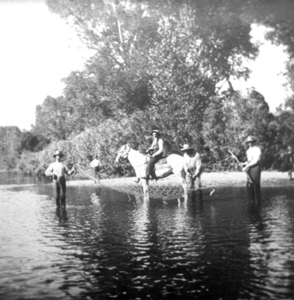
There have been several names for the Cache La Poudre River according to sources in the Fort Collins Local History Archive. The earliest name was Pateros Creek. When Major Stephen H. Long reported on his 1820 expedition to the Rocky Mountains, he referred to what is thought to be the Cache La Poudre River as Pateros Creek. He said it was named Pateros Creek from a "Frenchman who was said to have been bewildered upon it, wandering about for twenty days almost without food." He was found by a band of Kiowas who frequented this part of the country and restored to his companions, a party of hunters camping at that time on the Arkansas. (Story in 1936 Fort Collins Express Courier, no date).
A similar story was told to the son of an early settler named Simon Duncan. C.A. Duncan relates this story in his book Early Memories of the Cache La Poudre. C.A. said that an old fur trader, who was a friend of his father's, told him that he had camped in a dugout the winter of 1839-40 just north of Greeley. He said when he first camped there at an earlier date it was called Piteux (means 'Piteous' in French) Creek, because a party of trappers had left a young man camped there to look after the trap line. He became insane due to his isolation and wandered about until his clothes were torn to shreds, his hands and feet frosted, and when found was in a very pitiful condition. The trappers were so impressed that the name was given to the creek to express their feelings. When he was camped on the stream in 1840, it was called Cache La Poudre. Could "Pateros" somehow have been misinterpreted as "Piteux" or vice versa as the story was passed down?
In 1949 the Fort Collins Pioneer Association had a guest speaker, John Colhoff, an Indian historian from the Sioux Indian Museum in Rapid City, South Dakota. He told of the days when his grandparents, members of Ki-Ya-Ksa Indian band of Sioux, lived in the Fort Collins area and called the river "Minni Luzahan" which means "Swift Current." (Article pasted in the Pioneer Association Scrapbook, no date)
Abner Loomis told his story in the 1883 Fort Collins Courier. He related that Antoine Janis told him that it was in November 1836 that a large party of trappers and employees in the service of the American Fur company, while on their way from St. Louis to Green River, Wyoming camped near the present site of Bellvue. Antoine Janis, then a boy of 12, was with his father Antoine who was the captain of the caravan. During the night a heavy snowstorm, which continued for several days, set in and prevented travel for the time being. When the storm abated, the order was given by the wagon boss to lighten the heavily loaded wagons and continue the journey. A large, deep, cellar-like pit was dug, and in it were placed all the goods which could be spared. The pit was then carefully filled in, a pile of brush placed on it and burned, to make it have the appearance of an old campsite and thus deceive any Indians with thieving intentions. The wagon train went on and reached its destination safely. Later in the season some of the teams returned, reopened the pit, reloaded the goods that had been safely cached and departed without the loss of a single pound of freight. A large percentage of the cache was powder, and hence the name Cache La Poudre, a French phrase signifying "where powder was hidden." (Story from Ansel Watrous' History of Larimer County, 1911)
However, there was no known American Fur Trade expedition to this area in 1836 and in a letter dated March 17, 1883, Antoine Janis states that he first came to Colorado in 1844. Additionally, Colonel Henry Dodge stated in his diary that his expedition "Passed the mouth of the Cache de La Poudre" in 1835. Some historians believe that Janis was really referring to William Ashley's 1825 expedition to the area, for Ashley had a similar story of a snowstorm near Bellvue and he said "after fortifying his camp" he proceeded into the mountains and ultimately to Green River. Hopefully, some avid researcher will find the answer to this mystery.
.


Preserving the history of Fort Collins, Colorado & the Cache la Poudre region